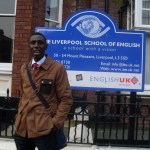In today’s society, changing faster than ever, teachers are faced with the challenge of how to adapt to changes in the field of methodology as well as technology to design courses that cater best for students’ needs. In this process we are constantly faced with new concepts and pedagogical paradigms, from which we have to choose the ones that are most suitable for our teaching and learning processes and thus equip our students with the knowledge and skills they will need in their professional lives as well for lifelong learning. Being part of IATEFL helps me to make my choices. I consider being an IATEFLer both engrossing and empowering.
I work with a whole community of teachers here in our fledgling association SELTA, which is an affiliate of IATEFL. SELTA stands for Sédhiou English Language Teachers Association. Sédhiou is located in the south of the country, at about 400 kms from the capital city Dakar (see map).
SELTA has existed for just a few years, starting in the 2011-2012 academic year. Our affiliation with IATEFL gave SELTA members the opportunity to receive the Voices newsletter and the possibility to apply for the yearly IATEFL conference scholarships. Three different colleagues had the opportunity to win and travel to the UK to take part in that prestigious ELT gathering. SELTA holds ELT events every year through what we call the English Language Day. Reports and narratives of that event are always sent and published in the IATEFL Voices newsletter. For example, IATEFL members can read my report on the 2013 Sub-Saharan Africa English Teachers’ Associations Symposium in Dakar, pages 30-31 of Voices 233. SELTA have also started to put together our own newsletter, ‘Thoughts‘, though we have only published one edition so far. With financial support, this is something we hope to do more in the future.
In addition to these, we organise workshops outside the English Language Day held every year. These are unique moments to help contribute to the capacity building of SELTA members. Due to the scarcity of resources, teachers and learners have to cope with a range of situations in their everyday activities. That’s why SELTA’s presence is very much welcomed as it tries to gather colleagues with a range of objectives, to find ways and means to cope with this recurring situation in this part of the country where the majority of schools are not equipped with power and internet facilities, compared to many other corners of the country.
Personally, what I’ve gained from IATEFL in general, and particularly from WMIS [Wider Membership Individual Scheme] and WMS [Wider Membership Scheme], has been helpful and invaluable, aiding both my personal and professional growth. It has given me more insights. This has been made possible by the rich sessions I attended through the five international conferences (Harrogate 2010, Brighton 2011, Glasgow 2012, Liverpool 2013 and Harrogate again in 2014), not to mention the famous ELT professionals I have had the chance to meet there, as well as the online resources and hard copy materials our IATEFL memberships provide us with. As well as giving presentations myself, I have also contributed to the Learner Autonomy SIG Independence newsletter.
Teachers continue to be tireless in their energy and enthusiasm to improve their services to make their teaching easier and more interesting, in the most positive and effective ways possible. I know that our associations can help them to do this.
 Latsouck Gueye was born in 1969 in Kaolack, Senegal. He went to Valdiodio Ndiaye School where he passed his Advanced Level Baccalaureate in 1991. He went on to obtain a Diplome Universitaire d’Etudes Litteraires (DUEL) certificate in English from Cheikh Anta Diop University in July 1992. In 2003, he left ENS (National School of Education, Dakar) with a CAE-CEM teaching certificate.
Latsouck Gueye was born in 1969 in Kaolack, Senegal. He went to Valdiodio Ndiaye School where he passed his Advanced Level Baccalaureate in 1991. He went on to obtain a Diplome Universitaire d’Etudes Litteraires (DUEL) certificate in English from Cheikh Anta Diop University in July 1992. In 2003, he left ENS (National School of Education, Dakar) with a CAE-CEM teaching certificate.
He has been a member of IATEFL and the Learner Autonomy SIG since 2008 and has spoken at three IATEFL international conferences, in Harrogate (2010), Brighton (2011), and Liverpool (2013). In 2011, he underwent an online course via the University of Maryland, Baltimore County where he obtained a Certificate of successful participation in EFL Assessment.
Latsouck is a Pedagogic Advisor and a member of the Senegalese National Commission of English. He is particularly interested in Writing & Assessment.